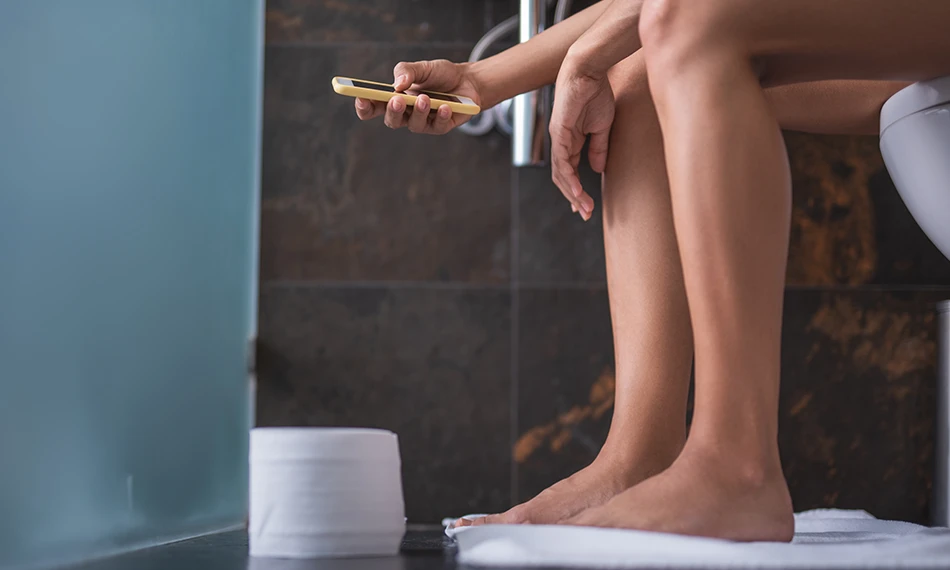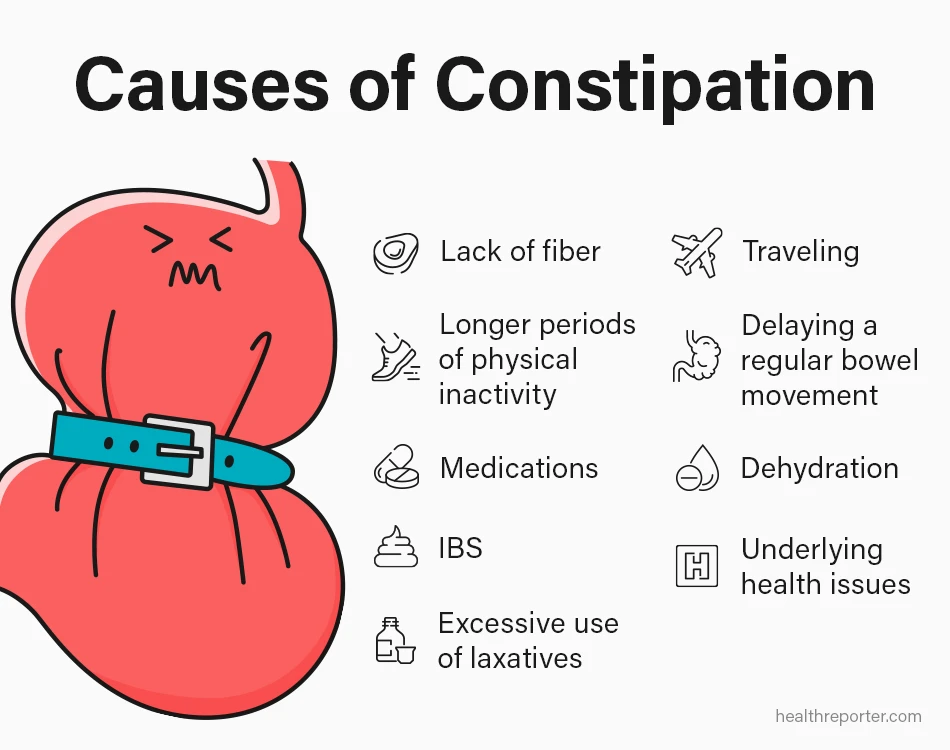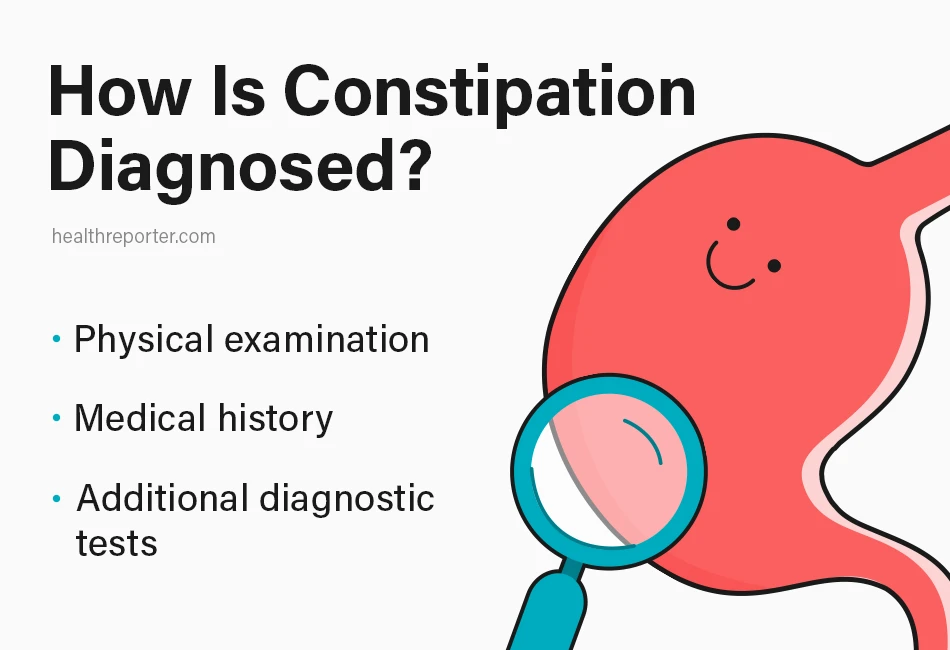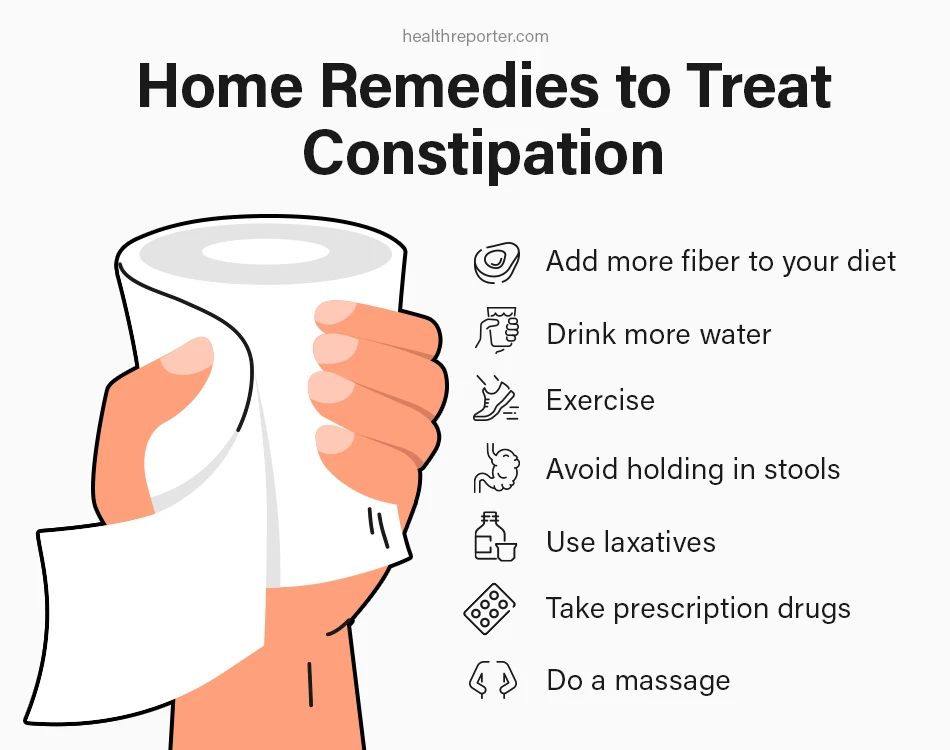Constipation Explained: Symptoms, Causes, and Treatment Methods
If constipation is disrupting your daily life, here is a guide to help you figure out the underlying causes and effective methods to find relief.

Constipation is a common gastrointestinal issue characterized by infrequent bowel movements or difficulty passing stools. A person might be suffering from the condition if they notice hard and dry stools. Some might even experience bloating or abdominal pain, which can interfere with day-to-day life.
However, constipation is considered more of a symptom than a disease in itself, and it can result from various factors. This includes an unhealthy diet, dehydration, a sedentary lifestyle, certain medications, etc. Sometimes, a large intestinal obstruction might make it difficult to empty the bowel, in which case you would require urgent medical attention.
Read on to learn how to identify the symptoms of constipation, its underlying causes, and the right method to effectively treat constipation.
What Are the Signs of Constipation?
Constipation is the most common gastrointestinal (GI) problem that affects around 16 out of 100 American adults. It is characterized by infrequent bowel movements or difficulty emptying the large bowel.
When stool moves too slowly through the colon, the colon absorbs more and more water from the stool, making it hard, dry, and difficult to eliminate.
You may be constipated if you experience the following symptoms:
- Passing stools less than three times a week
- Lumpy, hard, or dry stools that are difficult to pass
- Feeling of incomplete evacuation even after passing stools
- Abdominal discomforts, such as bloating, severe pain, or cramping
- Excessive straining to have bowel movements
You might be suffering from chronic constipation if you have been experiencing two or more of these symptoms for the last three months.
Typically, a person is considered constipated if they experience fewer than three bowel movements a week.
However, it is important to note that bowel habits can vary significantly from person to person. Some people pass stools three times a day, whereas others go once or twice a week.
When should you see a doctor for constipation?
Though most cases of constipation can be managed by making lifestyle changes or with over-the-counter remedies, it is recommended to make an appointment with your doctor if the symptoms of constipation don’t go away or if you notice the following:
- Blood in stools or toilet paper
- Persistent abdominal pain or bloating
- Unexplained weight loss
- Anal fissure (small tear in the anus)
- Fever or vomiting
- A sudden change in bowel habits
- Pain in the lower back
- Swollen, inflamed blood vessels (hemorrhoids/piles) in the anus
What Causes Constipation?
The lower part of your GI tract (including your colon and rectum) is concerned with absorbing water from the digested food and changing it from liquid to solid (stool). The muscles in the colon eventually push the stool out through the rectum.
When the normal functioning of the GI tract is disrupted, the stool remains in the colon for too long. Meaning, more and more water gets absorbed from the stool, making it hard and difficult to pass.

Several factors can lead to constipation, including the ones listed below.
#1 Lack of fiber
Adequate fiber intake is vital to keep the stool soft. Fiber adds bulk to the stool, allowing it to pass through the rectum easily. Without enough fiber, the stool becomes denser and smaller, leading to difficulty passing it.
In addition, fiber promotes regular bowel movements by stimulating the muscles in the intestine.
#2 Longer period of physical inactivity
Several studies in the past have found that physically fit people are less likely to experience constipation than their sedentary counterparts. Additionally, a study from 2013 states that increased mobility helps improve constipation in older adults.
Though the exact reasons are unclear, it is thought that long periods of physical inactivity cause the muscles of the digestive tract to be sluggish, thereby making it hard to propel food materials forward. The resultant slower transit time increases water absorption, making bowel movement more difficult and infrequent. For instance, it is normal to sometimes feel constipated after long rides or long periods of sitting.
#3 Certain medications
Some medications and dietary supplements can increase the risk of constipation by directly influencing the smooth muscle contractions (peristalsis) of the GIT or altering the water balance in the intestine.
Such medications include antacids containing aluminum or calcium, diuretics, iron supplements, high doses of vitamin D, opioid pain-relief drugs, anticholinergics, antidepressants, anticonvulsants, antibiotics, and calcium channel blockers.
#4 Irritable bowel syndrome (IBS)
IBS is a functional gastrointestinal disorder characterized by abdominal pain, distension, bloating, and changes in bowel habits. A subtype of IBS, IBS-C stands for IBS with constipation.
Constipation associated with IBS can fluctuate over time. In some cases, people suffer from loose stools and diarrhea instead of constipation.
#5 Excessive use of laxatives
Though laxatives stimulate bowel movement and help treat constipation, regular use leads to a condition known as laxative dependency.
Laxatives work in different ways. Some soften the stool, while others stimulate the intestines’ muscles or increase the stool’s bulk. When these mechanisms are constantly triggered, it leads to a laxative dependency, where the natural functioning of the digestive system is disrupted.
In other words, your body becomes reliant on external stimulations to initiate bowel movements, which can lead to a wide array of complications, including dehydration, an electrolyte imbalance, internal organ damage, and prolonged constipation.
This pushes a person to continue taking laxatives even when they no longer require them. Sometimes, they might need a higher dose for the same effect.
#6 Traveling
Travel-related constipation happens when your body’s usual routine is thrown off balance. When you are on the go, you might eat irregularly, rely on processed food, or even be dehydrated. These dietary changes can wreak havoc on your stomach and lead to irregular bowel movements.
In addition, the stress and anxiety associated with traveling can make you bloated and constipated.
Furthermore, traveling often includes extended periods of sitting or reduced physical activity. And just like a sedentary lifestyle contributes to constipation, it can also lead to travel-related constipation.
#7 Delaying a regular bowel movement
When you feel the urge to have a bowel movement, it means that your body is signaling you to eliminate the waste material accumulated in the rectum. By consistently suppressing or delaying this urge, you inadvertently signal your body that it should retain the stool.
If you ignore the urge to go, it may eventually go away. But the longer you wait, the drier and harder the stool will become, disrupting the natural rhythm of your digestive tract and causing constipation.
#8 Dehydration
Water plays a vital role in softening stools and promoting regular bowel movements. Dehydration causes the stool to become dry, hard, and difficult to pass, putting you at a greater risk of constipation.
While water, natural fruit and vegetable juices, and clear soups are good for combating dehydration and, thereby, constipation, some liquids can increase the risk of dehydration. This includes coffee or caffeinated drinks and alcohol.
#9 Underlying health issues
Several health conditions affecting the colon or other body parts can lead to constipation. Examples of colorectal problems include hernias, cancerous tumors, diverticulitis, inflammatory bowel disease (IBD), scar tissues, and colorectal stricture.
Other health issues that can increase the risk of constipation include:
- Neurological conditions – Parkinson’s disease, spinal cord injuries, multiple sclerosis, and stroke.
- Gastrointestinal disorders – tumors or blocks, celiac disease, and other inflammatory conditions.
- Hormonal problems – diabetes, hypothyroidism, uremia, and hypercalcemia.
- Cancer treatment – chemotherapy and opioid pain relief medications can trigger constipation.
How Is Constipation Diagnosed?
Your doctor will use a combination of medical history assessment and physical examination, and in some cases, additional diagnostic tests to determine if you are suffering from constipation.

#1 Medical history
You will be asked detailed questions about your constipation symptoms, such as the frequency and duration of your bowel movements and the consistency of stools, details about any medications or drugs you are taking, and about changes in diet or lifestyle since any of these can be the potential cause behind your constipation.
#2 Physical examination
When it comes to physical examination usually involves palpating the abdomen to check for abnormalities, listening to bowel sounds, or conducting a rectal exam with a gloved and lubricated finger to assess any blockages or abnormalities in the rectum.
#3 Additional diagnostic tests
In some cases, for instance, if the cause remains unclear or if there are concerning symptoms, the doctor might prescribe several additional diagnostic tests. This includes:
- Blood, urine, or stool tests to look for underlying medical conditions, thyroid disorders, or electrolyte imbalances.
- Imaging studies, such as X-rays, colonoscopies, or abdominal ultrasounds, to identify structural abnormalities or blockages.
- Anorectal function tests, including balloon expulsion test and anorectal manometry, to assess muscle function.
Before you make your way to the doctor, it is helpful to ask yourself these questions to understand the severity of your condition:
- Do I have fewer than three bowel movements per week?
- Am I noticing a change in the consistency of my stool–becoming hard, dry, or lumpy?
- Do I have to strain or use manual assistance to poop?
- Do I frequently experience abdominal pain, cramping, or bloating?
- Am I noticing any blood on the toilet paper or stool?
- Have I made any significant lifestyle changes, such as reducing fiber intake, working out less, or consuming less fluids?
Fast Home Remedies for Constipation and How to Prevent It
Constipation usually resolves itself without medical attention. However, it can cause discomfort and disrupt your daily routine. Fortunately, there are several ways to prevent the condition and promote regular bowel movements.

Here’s a checklist of things you can do to prevent constipation:
#1 Improve your diet
A high-fiber diet helps soften stools and make them easier to pass. An average adult should consume at least 25–30g of dietary fiber daily.
High-fiber foods are primarily plant-based. So, consider including fruits, whole grains, vegetables, nuts, and legumes in your meals, and cut down on low-fiber foods such as dairy and meat products and processed foods. Adding probiotics to your diet can also help relieve constipation.
#2 Drink more water
Drinking adequate water throughout the day is vital to soften the stool and prevent it from becoming dry, hard, and difficult to pass. Consider drinking 6–8 cups of unsweetened fluids, such as cranberry juice, every day. However, avoid caffeinated drinks and alcohol as they can cause dehydration.
#3 Exercise
Around 150 minutes of moderate exercise per week, about 30 minutes of physical activity per day for at least 5 times a week, can help make your bodily processes more regular, including bowel movements. Consider activities like walking, cycling, yoga, or swimming.
#4 Avoid holding in stools
If you feel the urge to pass stool, don’t ignore it – find a restroom as soon as possible. The longer you suppress the urge to defecate, the harder your stool will become and more difficult to pass.
#5 Use laxatives
If lifestyle changes fail, your next best option is to use laxatives sparingly. A healthcare professional can prescribe laxatives, colon cleansers, stool softeners, lubricants, or stimulants to help with constipation. Some laxatives can also be bought over the counter.
However, never use laxatives for more than two weeks as your body can develop a dependence on them.
#6 Take prescription drugs
In case of severe constipation, consult a healthcare professional who can prescribe your medication, such as prucalopride (helps the colon move the stool), lubiprostone (increases fluid levels in the intestine), or plecanatide (makes bowel movements regular).
#7 Other treatment options
Alternative ways for treating constipation and improving gut health include herbal remedies, acupuncture, massage, and moxibustion. Though a few studies have found these methods helpful in relieving constipation, more evidence is required to confirm their usefulness. Hence, it is always ideal to speak to your doctor before trying anything new.
FAQs
Common symptoms of constipation include infrequent bowel movements, stool appearing dry, lumpy, or hard, abdominal discomfort, bloating, and cramps.
A few quick ways to treat constipation include taking fiber supplements, drinking plenty of water, and regularly exercising. However, if constipation persists, consider visiting a doctor who would prescribe laxatives or stool softeners to provide relief.
How long it takes for laxatives to work depends on the type of laxative. Stimulant laxatives start to work within 6–12 hours, while osmotic laxatives can take anywhere from 12 to 72 hours. Bulk-forming laxatives have an effect within 12–24 hours.
While constipation itself doesn’t cause vomiting, prolonged constipation can slow down the entire digestive system. This delays the food from the stomach reaching the intestine and can potentially cause nausea and vomiting.
A Word From an MD
Constipation is an issue of the digestive system that affects people of all ages. While it is harmless, chronic constipation can significantly impact your quality of life.
Generally, constipation is caused due to lifestyle factors, such as a low-fiber diet, dehydration, physical inactivity, etc. However, it might also be stimulated by certain medications, medical conditions, or hormonal changes.
Though it is normal to experience short-term constipation occasionally, if it lasts for several weeks at a time, it is considered chronic and requires medical attention.
The good news is that you can prevent constipation efficiently by taking a few easy measures, such as drinking plenty of water, eating a healthy diet, establishing a bowel routine, responding promptly to the urge to defecate, etc.
Conclusion
Constipation is a common problem that particularly affects people as they age due to the usage of specific medications, the lack of physical activity, a low-fiber diet, and others.
Most often, constipation can be easily treated at home through a few lifestyle changes. However, if you experience chronic constipation, it is best to speak to a healthcare professional without delay.

















































 Select your language:
Select your language: 









